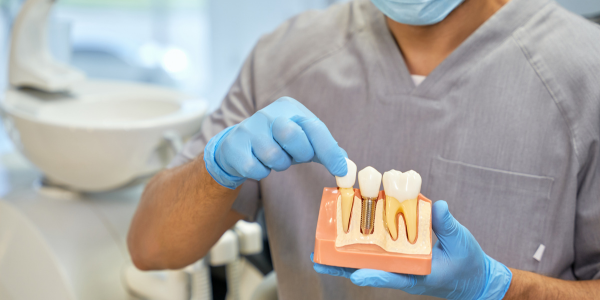Dental Implants

WHAT ARE DENTAL IMPLANTS?
What Makes Them So Effective?
Dental implants replace the root of the missing tooth, not just the visible part. This helps:
- Maintain jawbone health
- Prevent bone loss after tooth removal
- Provide a stable foundation for a natural-looking crown
Gentle on Natural Teeth
Unlike dental bridges, implants don’t require shaving down healthy neighboring teeth. This means:
- No unnecessary damage to your natural teeth
- Better long-term oral health
- Preserves the strength and life of your remaining teeth
Looks, Feels & Functions Like a Real Tooth
Once healed, the implant is topped with a custom-made crown designed to blend seamlessly with your smile — allowing you to eat, speak, and smile with confidence.
Are Dental Implants Right for You?
If you answer “yes” to any of the questions below, you might be a great candidate for dental implants:
Have you lost all your teeth in your upper or lower jaw?
Do you currently wear complete dentures but want something more secure and natural?
Are you missing several teeth and struggling to chew your food comfortably?
Do you have multiple damaged or decayed teeth that make eating difficult?
Have you been diagnosed with advanced gum disease that has caused bone loss, receding gums, or loose teeth?
Your Dental Implant Journey: What to Expect
Getting dental implants is a step-by-step process designed to restore your smile with comfort, safety, and long-lasting results. Here’s a simple breakdown of your treatment visits:
Visit 1: Consultation & Smile Planning
During your first visit, we gather all the information we need to design your custom treatment:
- A detailed consultation to assess your needs and goals
- X-rays or CBCT scans to check bone health and structure
- Intraoral scans for digital impressions (no messy molds!)
- Creation of a 3D model to plan your new smile
This visit helps us tailor the perfect treatment plan just for you.
Visit 2: Implant Placement
This is when the dental implant is placed into your jawbone:
- A safe, comfortable surgical procedure performed under local anesthesia
- Immediate placement of temporary teeth in some cases, so you won’t leave with gaps
Most patients return to daily activities within a day or two.
Visit 3: Final Teeth Placement
After the implant has fully healed and bonded with your bone:
- We evaluate the healing and ensure the implant is stable
- You’ll try in your custom crown or bridge for perfect fit and appearance
- Your permanent teeth are securely fixed to the implant
You walk out with a strong, natural-looking smile!
Important Factors to Consider Before Getting Dental Implants
Dental implants are a safe and effective treatment, but there are certain health and lifestyle factors that can affect their success. Here’s what you need to keep in mind:
1. Diabetes
If you have diabetes, it’s essential that your blood sugar levels are well-controlled before undergoing implant surgery. Uncontrolled diabetes can slow down healing and increase the risk of complications.
2. Smoking
Smoking—especially heavy smoking—can significantly delay healing and increase the risk of implant failure. Quitting or reducing smoking is strongly recommended before and after treatment.
3. Bone Health
The success of your implant depends on having enough healthy jawbone to support it. For best results, implants should be placed soon after tooth loss, as bone tends to shrink over time without a tooth.
4. Oral Hygiene
Maintaining excellent oral hygiene is crucial. Regular brushing, flossing, and dental checkups help keep the implant area clean and reduce the risk of infection or gum problems.
5. Choose a Qualified Specialist
Make sure your implant surgery is performed by a trained dental specialist, such as a:
- Prosthodontist
- Periodontist
- Oral & Maxillofacial Surgeon
This ensures a higher standard of care, precision, and long-term success.
Have Questions?
Every smile is unique. If you’re considering dental implants, we’re here to guide you every step of the way. Book your consultation today to get started!
